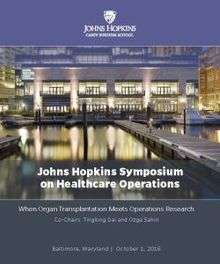Johns Hopkins Symposium on Healthcare Operations
The Johns Hopkins Symposium on Healthcare Operations is an annual conference series, sponsored by Johns Hopkins University's Carey Business School and supported by Johns Hopkins's business and medical faculty.[1] This international symposium is the first and only multi-disciplinary forum bringing together internationally acclaimed medical doctors, operations researchers and policymakers, with a focus on policy-related research on the delivery of healthcare.
| The Johns Hopkins Symposium on Healthcare Operations | |
|---|---|
 | |
| Genre | Multidisciplinary forum |
| Location(s) | The Johns Hopkins University, Baltimore, Maryland |
| Inaugurated | 2016 |
| Organized by | Tinglong Dai; Ozge Sahin |
| Website | carey |
Symposium structure
The symposium brings together leading business school, engineering school and mathematics scholars, medical doctors, and health policy makers to share the latest advances in operations research applied to healthcare, and promote multidisciplinary dialogues among academics, practitioners, and policymakers.
Each year, the symposium focuses on one medical specialty, for example, in the case of 2016, transplant surgery.
2016 Symposium: When Organ Transplantation Meets Operations Research
The theme of the first symposium, held on October 1, 2016, was "When Organ Transplantation Meets Operations Research." The 2016 symposium brought together operations researchers, transplant surgeons, and policymakers to share cutting-edge research and practice in organ donation, allocation, and transplantation.[2] The organizing committee was co-chaired by Tinglong Dai and Ozge Sahin from Johns Hopkins University, and also consists of Sommer Gentry from United States Naval Academy, Dorry Segev from Johns Hopkins Hospital, and Sridhar Tayur from Carnegie Mellon University.
The attendees include operations research / operations management scholars from major business and engineer schools, transplant surgeons, medical doctors, and medical researchers from both United States and Canada. Representatives from Health Resources and Services Administration, Scientific Registry of Transplant Recipients, OPOs, and private Insurers such as Highmark also attended the symposium.
| # | Topic | Speaker |
|---|---|---|
| 1 | Paired Kidney Exchange | Robert Montgomery from NYU Langone Medical Center. |
| 2 | Maryland Aggregate Pathology Index (MAPI): Development, Validation, and Future Research | Benjamin Philosophe from Johns Hopkins Hospital |
| 3 | MY-ATLAS: Mapping HCC Tumor Biology to Compute Equitable Exception Points | Sridhar Tayur from Carnegie Mellon University |
| 4 | Mitigating Information Asymmetry in Liver Allocation | Andrew Schaefer from Rice University |
| 5 | Applying Algorithms to Organ Transplantation | John Roberts from University of California, San Francisco |
| 6 | An Analytics-based Decision System for Kidney Offer Acceptance | Dimitris Bertsimas from Massachusetts Institute of Technology |
| 7 | OrganJet: Overcoming Geographical Disparities in Access to Deceased Donor Kidneys | Baris Ata from University of Chicago |
| 8 | Gerrymandering for Justice: Redistricting U.S. Liver Allocation | Sommer Gentry from United States Naval Academy |
| 9 | Matching and Participation in Kidney Exchange | Itai Ashlagi from Stanford University |
| 10 | OPO Operations | Charles Alexander from Living Legacy |
| 11 | Risk Assessment for Transplant-Transmissible Infectious Encephalitis | Pınar Keskinocak from Georgia Institute of Technology |
| 12 | Panel: How to Bridge Academic Research, Policymaking, and Medical Practice | Dimitris Bertsimas; Sommer Gentry; John Roberts; Sridhar Tayur |
References
- "Johns Hopkins Symposium on Healthcare Operations: When organ transplantation meets operations research". hub.jhu.edu. August 2016. Retrieved October 5, 2016.
- "Johns Hopkins Symposium on Healthcare Operations, Johns Hopkins Carey Business School, October 1, 2016". carey.jhu.edu. October 1, 2016. Retrieved October 4, 2016.